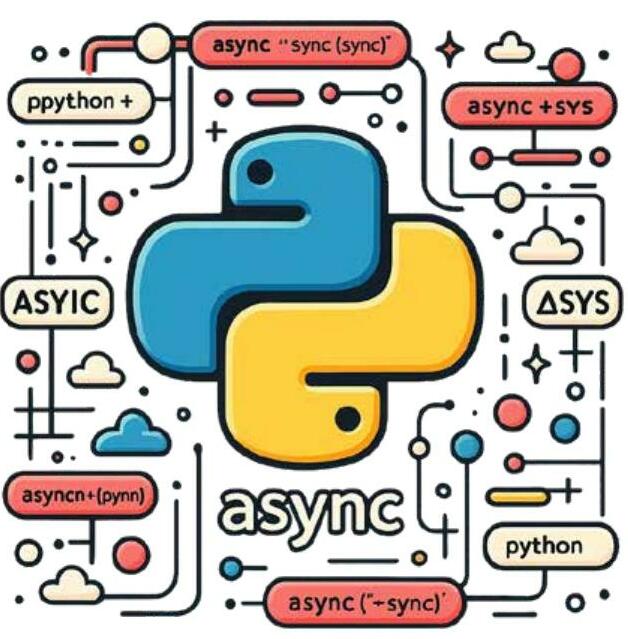Denemek ALTIN - Özgür
Why Python Developers Should Care About Asynchronous Programming
Open Source For You
|June 2025
Explore what asynchronous programming is, when it should be used, how Python supports it, and measure its performance as compared to synchronous programming.
-

In the era of data-driven applications and network-intensiv systems, writing efficient, scalable Python code is more important than ever.
When working with tasks like downloading files, calling APIs, or reading from databases, performance can take a hit if your program spends most of its time waiting.
This is where asynchronous programming shines. It is a way of writing code where tasks that take time — like file downloads or network requests — don’t block the entire program while they finish. Instead, your program continues doing other things.
This model is especially powerful for I/O-bound tasks, where your CPU spends time waiting for external responses (like servers or disks), rather than doing computations.
 When should you use it? Asynchronous programming is most beneficial when:
When should you use it? Asynchronous programming is most beneficial when: - Your application performs many network or disk I/O operations.
- You're working with concurrent user requests (e.g., in a web server You want to optimise waiting tim in data pipelines or API calls.
- You're building apps that need to scale to thousands of tasks concurrently.
However, if your tasks are CPU-heavy (like model training or image processing), multithreading or multiprocessing is more appropriate.
How Python supports asynchronous programming
Python provides native support for async workflows using:
- async and await keywords to define asynchronous functions (coroutines).
Bu hikaye Open Source For You dergisinin June 2025 baskısından alınmıştır.
Binlerce özenle seçilmiş premium hikayeye ve 9.000'den fazla dergi ve gazeteye erişmek için Magzter GOLD'a abone olun.
Zaten abone misiniz? Oturum aç
Open Source For You'den DAHA FAZLA HİKAYE

Open Source For You
Top 10 Open Source Tools for System and IT Administrators
All reputed online services have committed system and IT administrators working behind the scenes. Here are ten open source tools they should be aware of, as these can help them monitor, automate, as well as manage complex infrastructure with relative ease.
6 mins
February 2026
Open Source For You
Google opens access to its Gemini Deep Research Agent
Google has opened access to its Gemini Deep Research Agent for the first time, allowing developers to integrate advanced autonomous research capabilities directly into their applications.
1 min
February 2026

Open Source For You
NVIDIA buys SchedMD, keeps Slurm open source and vendor neutral
NVIDIA has acquired AI software company SchedMD, signalling a deeper commitment to open source technologies as competition intensifies across the artificial intelligence ecosystem.
1 min
February 2026

Open Source For You
How Open Source Tools Power Modern IT Operations
Open source tools have not replaced enterprise IT platforms; they have become the connective layer that makes modern operations possible.
6 mins
February 2026
Open Source For You
Mandiant's Auralnspector enhances Salesforce security
Google-owned cybersecurity firm Mandiant has released AuraInspector, a free, open source command-line tool designed to identify dangerous access control misconfigurations in Salesforce environments, marking a significant move to democratise enterprise-grade security testing.
1 min
February 2026
Open Source For You
Google launches Universal Commerce Protocol to power agentic AI commerce
Google has introduced the Universal Commerce Protocol (UCP), a new open standard that enables AI agents to autonomously perform end-to-end commerce activities, spanning product discovery, purchasing, checkout, payments, and postpurchase experiences.
1 min
February 2026

Open Source For You
Zero Trust CI/CD: The Death of Static Secrets
In an era where data breach costs continue to hit record highs, shifting to a secretless CI/CD pipeline is the most effective step to safeguard digital infrastructure.
7 mins
February 2026

Open Source For You
Quantum Algorithms: The Future of Computing
Explore the essence of quantum algorithms, their groundbreaking applications, recent innovations, and the challenges that remain.
8 mins
February 2026

Open Source For You
Bringing Clarity to the Chaos in AI
AI feels powerful, yet most teams struggle because they cannot define what intelligence they really need. But there are ways to address this challenge.
5 mins
February 2026

Open Source For You
Top researchers return to OpenAI
OpenAI has welcomed back three high-profile researchers, Barret Zoph, Luke Metz, and Sam Schoenholz, following their brief tenure at former OpenAI CTO Mira Murati's AI startup, Thinking Machines.
1 min
February 2026
Listen
Translate
Change font size

